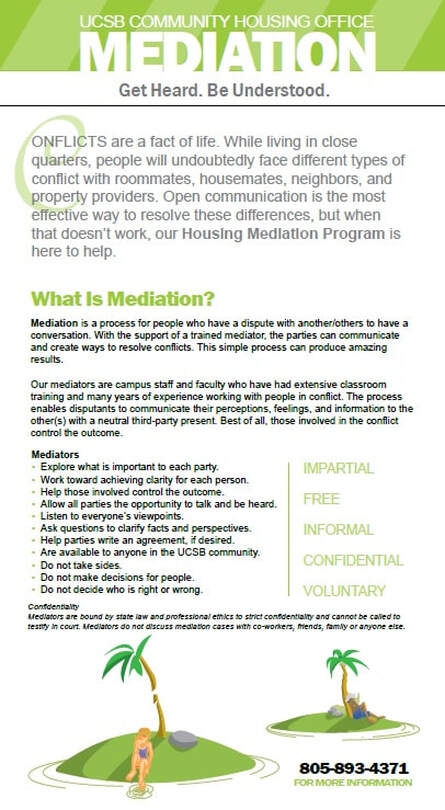So you're sharing a small space with a bunch of people. What could go wrong?
Students often find that it's tough to live with others for variety reasons. Differences in personalities and differences in habits between roommates, among other things, can cause conflict. Simply not feeling that you have a space of your own can also feel stressful.
Check out this page to learn more about how to more effectively navigate common challenges that come with living with others.
Students often find that it's tough to live with others for variety reasons. Differences in personalities and differences in habits between roommates, among other things, can cause conflict. Simply not feeling that you have a space of your own can also feel stressful.
Check out this page to learn more about how to more effectively navigate common challenges that come with living with others.
Building a Foundation for Success: Establishing the Rules of the Room/House
So you've picked your roommates/housemates and are excited to start off the year. One of the ways that students get themselves in trouble is that they avoid having a conversation with their roommates/housemates at the beginning of the school year to establish "house rules" and instead they just hope that things will work out okay. Having a collaborative conversation helps to set expectations and establish respectful co-existence in your home space.
What topics should you minimally address in this conversation? Here are our suggestions:
What topics should you minimally address in this conversation? Here are our suggestions:
- What are each of your study habits? Do you need a totally quiet environment when you study or is background noise/activity fine with you? Perhaps establish quiet times for your room so you can use it to study.
- What are each of your sleeping habits? Go to bed early or stay up late? Do you need a quiet room when you are sleeping? Establish rules for weekdays and weekends (e.g., lights out, noise level)
- What are your habits around cleaning? Set a schedule of chores for keeping the room livable (e.g., emptying garbage, laundry, organization)
- What are your habits around listening to music? Playing video games? Watching tv? Find ways that you can enjoy these together but also ways to minimize disruption to others (e.g., headphones).
- What are each of your habits and feelings toward substance use? Know the rules of your residence/housing but also establish the rules of your room.
- What are your feelings about visitors to your room? Overnight guests? Romantic partners staying over? Remember that you have the right to set boundaries about this for your comfort and safety.
- What are the items that are shareable? Refrigerator (and the food in it)? Microwave? Food? Establish the rules about what is on/off limits and expectations about how you will maintain these so they stay in good condition.
Resolving Conflict with Current Roommates/Housemates
Effective and open communication is critical to successfully resolve conflicts in your living situation. When a problem arises, the best way to resolve it is to talk with the individual(s) involved. Many times, if everyone follows a few simple guidelines, the conflict can be resolved peacefully.
|
Basic Rules of Communication When You Have A Conflict
Acknowledge the conflict as soon as possible. If something is upsetting, don't just sweep it under the rug. Take a moment to understand why you are upset and let your roommate(s) know what you want to talk about. Promptly acknowledging issues as they come up enables each person to address the issues with clarity and get them resolved before tensions build up. Decide on a good time that all of you can meet. Make a time when everyone has their best energy and attention so that you all can approach issues more reasonably. Make sure that everyone involved in the conflict is present during the discussion. Set the ground rules for discussion. Give everyone equal time to speak. Listen attentively. Stick to the issue(s) at hand. Respect each other. Respect for each other and each others' feelings is critical. Avoid name-calling, blaming or exaggeration. Put your best foot forward. If emotions are running high, take a break and take a breath. Understand what was making each of you upset. Come back to talk again. Make a plan of action together and try it out. Once you have decided on a course of action, try out the plan. Make sure to decide on a time to check back in to see how the plan is working for each of you, that way you can work on how to fix the things that aren’t working well and strengthen the things that have worked. ~excerpts taken from the UCSB Community Housing Office brochure on mediation WHY USING TEXT/EMAIL/IM TO RESOLVE CONFLICT BACKFIRES
If it is important enough to say, make sure you say it face-to-face. Students often tell us that they text, email, or IM when something is bothering them because they are nervous about confronting someone face-to-face and they expect an unpleasant, negative interaction. But ironically, texting, IMing, or emailing someone about what is bothering you is more likely to lead to greater tension and misunderstanding. Why? It's easy to misread or misinterpret the tone and intention of something that is written. When you talk face-to-face, you each can see how the other is impacted by the words that are said. These cues are important to having empathy for one another. When can you use text, email, or IM? You can use it to let someone know you that you want to talk and what you want to talk about (e.g., "Hey there....our interaction earlier felt bad to me. Wonder if we can talk about this tonight to work it out. How about 9 pm?). But, make it a rule not to litigate any matter further over text, email, or IM channels. Respectful, calm face-to-face interactions, even in the face of conflict, is an important life skill. It takes practice, Before you know it, it will get easier. |
Did you know?
Following the communication guidelines will work for most conflicts that arise within a household. But, there are some that may require assistance from a third party. If you have an RA, consider talking with them about the challenges you are having with your roommate(s). Also, the Community Housing Office offers mediation services for students who have a significant dispute. Parties meet with the support of trained mediators to communicate openly and create ways to resolve conflicts. Mediation is appropriate for the following:
|
|
|
|
Proudly powered by Weebly


